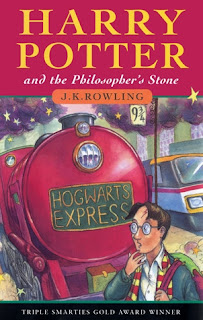 Harry Potter and the Chamber of Secrets by J.K. Rowling
Harry Potter and the Chamber of Secrets by J.K. RowlingMy rating: 5 of 5 stars
One of my criteria for a good book is that I must enjoy re-reading it, and I enjoyed reading this one for the third (or perhaps the fourth) time almost as much as I did the first time.
The Harry Potter series came out at a time when there was a dearth of good children's books. For years the children's shelves in book shops had been filled with dreck like the "Goosebumps" series, and so one of the reasons the Harry Potter books seemed so good was simply the contrast with the other reading material available at the time. But twenty years later this one still seems good, and that, to me, indicates that it has stood the test of time, and can be counted as a classic of children's literature.
I recall, from my first reading, that I liked this one best one the whole series, Each book in the series seemed to be longer than the previous one, and the quantity did not seem to correlate with quality, so I don't know how far I'll get with the series in this re-reading, since I recall that it was all downhill from here.
I enjoyed the first one in the series, Harry Potter and the Philosopher's Stone, almost as much on re-reading, though there were a couple of rather disconcerting plot holes in that one.
By now the Harry Potter books have been translated into many other languages (they even needed to be translated into different dialects of English for American readers). I've referred to some of the difficulties of translating children's books, including the Harry Potter books, for readers of different cultures here The Owl Service: reading and culture | Khanya. Someone even wrote a doctoral thesis on the difficulty of translating the Harry Potter books into SePedi, not least the idea of travelling to school by train -- for rural South African children it might need to be translated to bus or taxi.
But perhaps the most difficult concepts to translate are those of witchcraft and wizardry. In British culture, since the Enlightenment, witches and wizards have generally been figures of fun, and are not seen as posing any real threat. They are not seen as "real", so fiction writers can portray them any way they like, and sometimes in vastly varying ways. An English reader can change the parameters for legendary and imaginary beings without much effort. When you read of Legolas the elf in Tolkien's Lord of the Rings, you know the parameters are different from those of Dobby the house elf in the Harry Potter books. But in SePedi culture, at the very time the Harry Potter books were first bring published, some people were burning suspected witches (baloi). In SePedi culture the parameters of the concept "witch" are far narrower and more rigid than they are in English, and they are seen by many people as a very real threat. So I wonder how well the Harry Potter books translate into other cultures.
View all my reviews

No comments:
Post a Comment